- Home
- Beverly Cleary
Socks Page 2
Socks Read online
Page 2
“Are you sure?” Mr. Bricker’s voice registered excitement, worry, and joy all at once.
Socks waited. These people had to learn.
“I’m positive,” said Mrs. Bricker in a small, scared voice. “This is it.”
With great dignity Socks stalked to the one piece of furniture forbidden him: the chair with the loopy upholstery. He placed his forepaws on the chair, arched his back, and pulled. Rip, rip, rip. There.
The Brickers gave Socks attention, but not in the way that he expected. He found himself snatched up, carried down the hall, and tossed into the dark laundry beside his pan of Kitty Litter. The door shut after him. “Sorry, old boy,” said Mr. Bricker, as he gave the door an extra push to make sure it was latched.
After a moment of shocked silence, Socks let out a yowl of rage and waited for release. He could hear the Brickers talking in quick, anxious voices. He could hear the whir-whir-whir of the telephone dial, but he did not hear anyone coming down the hall to let him out.
Socks meowed his loudest, crossest meow. Footsteps hurried, the front door slammed, out on the driveway the old station wagon started, died, started again and drove away. The house was silent. So was Socks. After months of catnip and kidney, of service and attention, to be treated like this!
In the days that followed, Mr. Bricker dumped food into Socks’s dish early in the morning before he left the house and again at night after he returned, but in between Socks was alone. He waited on the windowsill, he slept, he honed his claws on the forbidden chair, although the sport was gone. The ringing of the telephone made him anxious when no one was home to answer. The buzzing of the doorbell frightened him, so that he hid under the bed, but he need not have bothered now. No one came to open the door. Socks lost interest in food. His Ping-Pong ball no longer amused him. Without love he was bewildered and dejected.
Then late one morning Socks was roused from a doze by the slam of the station-wagon door on the driveway and the sound of the voices of both his owners. With glad meows he sprang from the couch. As soon as the door opened, Socks was outside, his forepaws against Mrs. Bricker’s thigh, stretching up to be petted. A light breeze ruffled his fur, and spring sunshine drew the fragrance from the lemon blossoms. Life was good again.
“Did you miss me, Socks?” Mrs. Bricker stooped to rub the hollow behind his ears where his fur grew short and fine. “Were you lonesome without me?” she asked.
Socks’s throat pulsated with purrs. He rubbed against her legs, back and forth, round and round, as she entered the house. He could not get enough petting to satisfy his pent-up loneliness.
“I missed you, too,” said Mrs. Bricker in such an understanding voice that Socks felt he must take advantage of her. With a hopeful meow, he started toward the kitchen, paused, and looked back to encourage her to follow him to the refrigerator. Until that moment he had been so happy to see his family that he had not noticed the bundle in Mr. Bricker’s arms.
Socks hesitated. Which was more important, a tidbit from the refrigerator or his right to investigate everything that came into the house? Curiosity won, and he turned back.
“See what we’ve brought,” said Mr. Bricker.
A smacking noise came from inside the bundle. Instantly Socks was alert. There was something alive in there. His spine prickled, and he paused to sniff cautiously.
Mrs. Bricker folded back the blanket, and Mr. Bricker leaned over so Socks could see. He saw a creature with a small, wrinkled, furless face, a sight that made his hair stand on end. His eyes grew large and he backed away. Whatever the thing was, he did not trust it.
As Socks stared at the strange creature in the bundle and listened to it smack and snuffle, he began to understand. His owners, his faithful, loving owners, had brought home a new pet to threaten his position in the household. Socks turned his back and lashed his swollen tail. He was filled with jealousy and anger and a terrible anxiety. The Brickers might love the new pet more than they loved him.
“Poor Socks.” Mrs. Bricker stooped to smooth his fur, but Socks moved away from her hand.
An unhappy wail came from the bundle.
“Oh, dear! He can’t be hungry already.” The worry in Mrs. Bricker’s voice was a new sound to Socks.
“He sure can,” said Mr. Bricker, as he sat down on the couch with the wailing bundle on the lap that had always belonged to Socks. “Listen to him! You can tell he has a fine pair of lungs.”
Socks turned his back and began washing to pass the time until he made up his mind how to regain the lap from the new pet.
On her way to the kitchen, Mrs. Bricker spoke in her special voice, higher than her normal voice, that she always had used for her cat. “I’m hurrying,” she said. “I’ll have your bottle in a minute.”
Socks paused in his washing with one paw behind his ear until he understood that this time she was not speaking to him, a slight that hurt him almost as much as the loss of the lap. He scrubbed his paw back and forth across his nose until he could contain his longing for reassurance no longer.
Alert and ready to run at the first sign of danger, Socks crept cautiously toward Mr. Bricker, who reached for the bottle his wife had brought from the kitchen and said, “Let me feed him. You sit down and rest.”
Mrs. Bricker sat down, but she did not rest. “Are you sure you know how to feed him?” she asked. Both parents spoke of the baby as “he,” as if he were a stranger whose name they had not caught.
“Nothing to it.” Mr. Bricker offered the bottle to his son. Greedy smacks came from the bundle. “Hey, look at him go!” said the proud new father.
Socks took a chance. He leaped to the center of the couch, cautiously set one paw on Mr. Bricker’s knee, leaned forward, and sniffed a sweet, milky fragrance.
“Careful, Socks,” warned Mr. Bricker. “You can look but don’t come too close.”
Socks stared at the tiny wrinkled face with a mixture of fear, curiosity, and jealousy. He saw the baby open his eyes and raise one nightgown-covered fist as if he did not know it belonged to him. He saw the baby’s head wobble and his eyes cross. Socks began to understand that the creature was not a pet but a new kind of person, a person so small that he left room on the lap for a cat. Very well. They would share the lap, but this concession did not mean he liked the new person. Socks felt that half a lap was better than none.
Socks put a second paw on Mr. Bricker’s knee, and with his eyes half-closed he began to knead and to purr.
“Ouch.” Both of Mr. Bricker’s hands were occupied. “Take your claws out of my leg.”
Socks found himself lifted by Mrs. Bricker and set on the floor without so much as a kind word. He resumed his washing to show his owners that he had business of his own to take care of. Let them attend to theirs; he would attend to his. He groomed his tail with long, hard rasps of his pink tongue. The baby’s smacking changed to fussing, another sound new to Socks. He hoisted his hind leg and went to work on his toes while he observed all that was going on. Beyond his hoisted leg he could see Mrs. Bricker leaning anxiously over her baby.
“Maybe he needs to be burped,” she said.
Mr. Bricker held up the bottle. “You’re right. He’s taken two ounces.” He set the bottle on the table at the end of the couch, raised the baby to his shoulder, and began to pat its back. Still the baby fussed. Mr. Bricker patted harder.
Socks lowered his leg. There was plenty of room on the lap. No, better not risk reclaiming it so soon. He went on with his grooming, but he began to grow uneasy. He wanted the fretting to stop, the same way he always wanted the ringing of the telephone or the buzzing of the doorbell to be silenced.
“Try rubbing instead of patting,” suggested the anxious mother. The father rubbed. The fussing became a wail. Mr. Bricker rubbed the tiny back, and Mrs. Bricker patted. Socks became so anxious to have the crying stop that he no longer could pay attention to his washing.
“Maybe we don’t pat the right way,” said the mother.
“How else can
you pat?” The father was beginning to see that there was more to feeding a baby than he had realized.
Socks took a chance and leaped up to fill the lap, which was going to waste.
Mrs. Bricker promptly returned him to the floor. Socks was deeply hurt. Filled with sorrow and longing, he lay down on the carpet with his chin on his white forepaw and stared into the black and empty fireplace. He yearned to be held and stroked and reassured. He longed to have his master hold him and play with his tail, and Socks was most particular about allowing people to play with his tail. With a deep sigh, Socks closed his eyes, but he did not sleep. His ears, moving like tiny radar screens, picked up every sound.
“What are we going to do?” Mrs. Bricker sounded almost tearful. “If we don’t get the air bubble up, his stomach will go on hurting, and he’s too little to hurt.”
“Feeding a baby can’t be this hard.” The father no longer sounded confident. “The world is full of dumbbells who feed babies. How else do babies survive?”
“Try putting him face down across your knees,” suggested Mrs. Bricker. “I saw somebody do that once.”
The radar ears caught the soft sounds of the baby being moved, followed by gentle patting. “Try rubbing,” suggested the hovering mother again.
Suddenly the baby belched. Startled, Socks raised his head and stared. The whole family was relieved: the baby, the mother, and the father, who were beaming at the miraculous thing their baby had done. Socks was relieved, too, because at last the crying had stopped.
“Charles William!” Mrs. Bricker spoke to her accomplished son by name. “Ooh, such a big noise from such a little fellow!”
“Attaboy!” Mr. Bricker congratulated his son. “That’s the old fight!”
The atmosphere of the room had changed from one of anxiety to one of joy, which Socks felt was his to share. This time he stood at Mr. Bricker’s feet and looked up uncertainly as if to say, “I’m part of the family, too.” The Brickers were too busy to notice.
“Why, Charles William is asleep already,” whispered Mrs. Bricker, as she bent over her son. “Here, let me take him. I’ll put him down in his crib.”
Now, thought Socks. Now with the new person out of the room, he would regain the lap. Before he could jump, however, Mr. Bricker picked up the bottle, which still held several ounces of the baby’s formula, and started toward the kitchen. Socks got there first and sat down beside the refrigerator. See how patiently I am waiting beside our refrigerator, his attitude seemed to say.
Mr. Bricker unscrewed the top from the bottle. “Socks, it isn’t time for you to eat,” he said, and was about to dump the formula into the sink when Socks uttered such a wistful meow that he changed his mind. Mr. Bricker found a bowl, poured the formula into it, and carried it into the laundry where his feet crunched through the Kitty Litter that Socks had scattered the night before. He set the bowl on the newspaper beside Socks’s dish. Socks crouched and began to lap the sweet-smelling milk with his quick pink tongue.
“Did you think we had forgotten you?” asked Mr. Bricker.
Although Socks did not care to be interrupted while eating, this time he made an exception and gave his master a long stare that said, “How could you bring that new person into our house? Now you have spoiled everything.”
Sad and confused, Socks went back to lapping up the formula in the bowl. The warmth and sweetness of the milk comforted him. He lapped every drop and then licked the empty dish so hard that he moved it across the newspaper until it bumped the wall. Socks needed every drop of consolation he could get. His owners loved the baby more than they loved him.
3
Socks and the Formula
The arrival of Charles William upset the order of Socks’s life. Meals were no longer served on time. Laps were always occupied. Lights were turned on in the night. The washing machine swished and the dryer hummed at odd hours. The house was filled with lint from new diapers, which tickled his nose. The Brickers’ friends, who once had admired Socks, now came to admire the baby. Tiffy, the little girl next door who loved babies and who also liked to pick up cats, usually around the middle, came to watch Charles William’s bath almost every morning. Socks spent a lot of time sneezing among the fluffs of dust under the bed in the front bedroom, where Tiffy could not get at him.
The one comfort in Socks’s life was leftover formula, sometimes a few drops and sometimes an ounce or two, which was poured into his bowl after the baby was fed. Socks began to wait for the sound of Charles William smacking at his bottle.
That baby! His cries grew louder and his smacks greedier. His neck became strong enough to support his head. His eyes stopped crossing. He made the exciting discovery that his hands belonged to him, and he waved them happily. He kicked his feet and said, “Ug-gug-gug.”
“He’s a big boy. Yes, he is!” cried Mrs. Bricker in the voice that used to belong to her cat.
Socks, on the other hand, grew lazy. Instead of chasing his Ping-Pong ball across the living room, down the hall, and into the bedroom, where Mr. Bricker would have to reach for it, he now patted it with a curved paw and let it roll off by itself. When the mailman brought Charles William another present, Socks examined the wrapping paper, but he no longer bothered to hide under it or to play with the ribbon.
One Sunday afternoon Socks, comfortably full of warm formula, was dozing in a patch of sunshine on the living room carpet when another set of visitors arrived to see the baby. They were Charles William’s Uncle Walter, Aunt Cassie, and eight-year-old cousin Mike, who was carrying a package wrapped in paper printed with blue rabbits. Socks remembered these people. Aunt Cassie’s lap was narrow and hard. Uncle Walter enjoyed rumpling a cat’s fur so that the cat had to lick and lick and lick to get himself in order. Mike teased. This afternoon, however, Socks felt too comfortable and drowsy to flee.
The first thing Uncle Walter did upon entering the house was to take off his hat, which he wore to cover his bald head, and shy it across the room so that it landed on Socks. “Hi ya, Socks, old boy,” said Uncle Walter. Then he added to Mr. Bricker, his brother-in-law, “I see you’re still keeping that cat.”
Socks glared from under the brim of the hat, but he did not budge.
Mrs. Bricker proudly carried Charles William into the living room to show him to her brother’s family. She had dressed him in one of the many little knit suits that the mailman had brought, and his rosy feet were bare.
Charles William took one look at Uncle Walter and screamed. Socks came out from under the hat with a start and retreated under a chair. He recognized fear when he heard it and accepted the scream as a warning of danger. If Charles William was in danger, so was he. Maybe Charles William was of some use after all.
Mrs. Bricker also recognized the cry of fear. She sat down on the couch and held Charles William close. “Did something frighten the baby?” she asked tenderly. “It’s all right. Nothing’s going to hurt the baby.”
Charles William hid his face in his mother’s neck and sobbed.
“Maybe a pin is sticking him,” suggested Uncle Walter.
Charles William, braver when his mother held him close, stole a look at the visitors, shrieked again, and shivering with sobs, hid his face. Socks peered from under the chair. Everyone was seated, and although the Brickers were concerned, no one appeared frightened.
“Oh, it’s just Walter’s bald head,” said Aunt Cassie matter-of-factly. “All babies are frightened the first time they see a bald head.”
“What am I supposed to do?” asked Uncle Walter. “Take off my head and carry it under my arm?”
Aunt Cassie, not a woman for baby talk, took hold of Charles William’s hand. “Charles William, you are a fine healthy boy,” she said, and turned to her son. “Mike, say hello to your new cousin.”
“Hi, Chuckie,” said Mike, who plainly thought babies boring. Visiting relatives was boring, too, and a waste of a good afternoon. He set the package on the couch as if he were glad to be rid of it and flopped back i
nto a chair.
Charles William took his face out of his mother’s neck, looked at Uncle Walter, and howled again.
“For goodness’ sake, Walter, put on your hat,” said Aunt Cassie. “Nobody cares if you wear it in the house, and you can’t expect a baby to understand the whole world all at once.”
Uncle Walter picked up his hat from the carpet and did as he was told. Charles William’s sobs ceased.
With the danger, whatever it was, out of the way, Socks turned a wary eye on Mike, who was slumped in a chair staring at the ceiling. The boy looked harmless enough, but Socks did not trust him for a minute. As he watched, his ears picked up the faint threatening wail of another cat, the sort of wail that leads to fighting with fangs and claws. The wail grew louder. Where could the cat be? Socks looked anxiously around the room, half expecting to see the old black cat that sometimes prowled across the backyard. The sound was all the more frightening because Socks could not find the creature who was making it.
“Mike, stop that noise,” said Aunt Cassie. “You’ll frighten Charles William. And stop slouching.”
The cat wail stopped, but Socks continued to keep an eye out for the enemy. He also watched Mike, who remained slumped in the chair, bored with the opening of the gift, bored with all the exclamations over the brown corduroy bear that his mother had bought at a church bazaar.
The small bear caught Socks’s attention, and he did not find it boring at all. The bear was going to make a good sparring partner, and Socks could not wait to get at it.
“All babies love soft bears, and I knew you had enough clothes by now,” said Aunt Cassie, who was holding Charles William on her lap. “Have you started him on egg yolk yet?”
Socks looked longingly at the bear, which Mrs. Bricker was holding on her lap as if she needed something to take the place of Charles William.
“Say, Bill,” said Uncle Walter to Mr. Bricker, “have you thought about buying the kid an encyclopedia? Now’s a good time. The price goes up the first of the year.”

 Ramona Quimby, Age 8
Ramona Quimby, Age 8 Dear Mr. Henshaw
Dear Mr. Henshaw Beezus and Ramona
Beezus and Ramona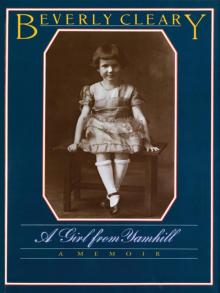 A Girl from Yamhill
A Girl from Yamhill Ramona Forever
Ramona Forever Jean and Johnny
Jean and Johnny The Luckiest Girl
The Luckiest Girl Emily's Runaway Imagination
Emily's Runaway Imagination Ribsy
Ribsy Ramona the Pest
Ramona the Pest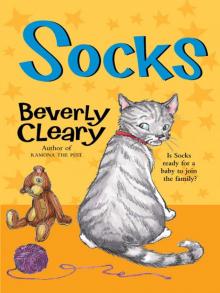 Socks
Socks Ramona's World
Ramona's World Strider
Strider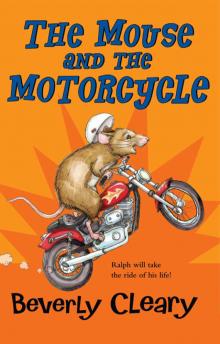 The Mouse and the Motorcycle
The Mouse and the Motorcycle Henry and the Paper Route
Henry and the Paper Route Ramona the Brave
Ramona the Brave Henry Huggins
Henry Huggins Ramona and Her Mother
Ramona and Her Mother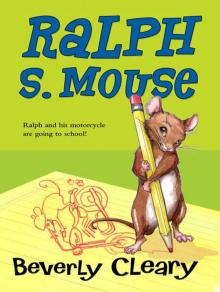 Ralph S. Mouse
Ralph S. Mouse Sister of the Bride
Sister of the Bride Henry and the Clubhouse
Henry and the Clubhouse Muggie Maggie
Muggie Maggie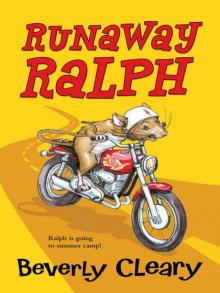 Runaway Ralph
Runaway Ralph Ramona and Her Father
Ramona and Her Father Henry and Ribsy
Henry and Ribsy Henry and Beezus
Henry and Beezus Two Times the Fun
Two Times the Fun Fifteen
Fifteen Mitch and Amy
Mitch and Amy